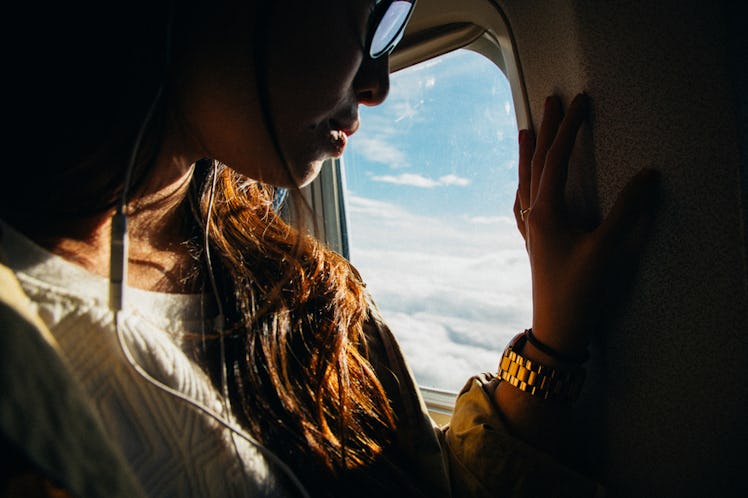
How To Prevent A Cold While Flying So You Don't Get Sick Right Before Spring Break
Spring break is fun, but depending on where you're headed, there could be an unexpected obstacle to tackle: If you have to fly to get to your destination — which might entail several hours of being up in the air, multiple airport stops, and a miserable layover or two — you might just come face-to-face with a bunch of germs ready to ruin your vacay. Of course, the absolute worst case scenario for anyone would be spending money on a trip only to get sick on the way there. Learning how to to prevent a cold while flying is similar to cold and flu prevention in general, with one primary difference: the air circulation.
Because of the high volume of people onboard, who are all touching and using the same facilities and products, airplanes can be a cesspool of bacteria, according to TIME. That's not exactly new information, but to put things in perspective, consider this: Researchers from Auburn University in Alabama found that strains of staph bacteria can survive for days at a time on airplane surfaces. When you think about how many people might fly on the same plane every single day, this is pretty terrifying.
Airplanes may be a total hotbed for germs, but this doesn't have to be a death wish for you and your dream vacation. Just follow these five simple rules for travel cleanliness, and you'll be well on your way to sunshine and relaxation in no time.
01Stay Hydrated Before, During, And After Your Flight
When you're flying, time seems to stop, and you can often forget the basic tenets of staying healthy. But airport travel actually requires more hydration than on any other normal day, according to Caring.com, which makes it all the more important to keep chuggin' those small cups of water that the flight attendants are passing around. Or, better yet, bring your own refillable water bottle with you so you don't have to ask for cup after cup.
Pro tip: It's not just about hydrating during your flight. Chugging a bunch of water before your flight will help you to balance out the amount of water you might lose when you're in the air, given how low the humidity is at 30,000 feet of altitude.
02Turn That Air Vent On, Not Off
Popular opinion tends to warn you away from that little blowhole of dry air blasting you from above your seat, but in truth, you're probably better off keeping it on.
Circulation helps to keep sickness outbreaks at bay, according to ABC News, and contrary to what many people believe, airport air is safe and filtered. It's not the air that's going to crush you; it's the dude sitting next to you who's coughing all over the place. Make sure you're getting some clean air, rather than breathing in all of his germs.
03Wash Your Hands — Like, A Lot
Wash. Your. Hands. If you do only one thing to keep yourself from getting sick, this should be it. Wash your hands before, during, and after flights.
Ideally, you want to scrub your hands for at least 20 seconds in order to get rid of all the germs, according to the Centers for Disease Control and Prevention (CDC). If you can't wash your hands, the CDC suggests an antibacterial gel with at least 60 percent alcohol.
For real guys, wash your hands. Live by this mantra. Practice it. Preach it.
04Pack A Meal To Bring On Your Flight
The more you can minimize your contact with all of the products and facilities on an airplane, the better. Packing a snack to nibble on, instead of eating whatever the flight attendants give you, will save you the bacteria-ridden experience of opting for a bag of chips that have been manhandled all over the continental U.S.
Plus, you can be in control of your nutrition this way, which will also contribute to a healthier flying experience overall.
05Bring Some Nasal Spray
Airplane cabins can get extra dry when you're flying due to the high altitude, so bringing a nasal spray onboard will help keep your nasal passages moist, according to CBC News, which will, in turn, allow those tiny hairs in your nose to keep doing their job of preventing germs from entering.
If you tend to get dry eyes, bringing eye drops won't hurt either. Between the nasal spray, bottle of water, and eye drops, you'll ensure your body is properly, um, lubricated, from start to finish.
06Avoid The Bathroom If You Can Help It
If you can bear it, try to avoid using the airplane bathroom at all costs, since that tiny little box is in no way guaranteed to be 100 percent sanitary, according to Condé Nast Traveler.
When you do need to use the bathroom (all of that hydrating will likely take a toll eventually), try to touch as little of it as possible with your bare hands, using a napkin to press flush.
Happy (and healthy) travels!